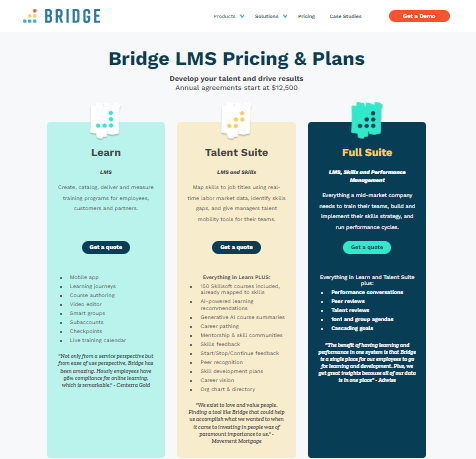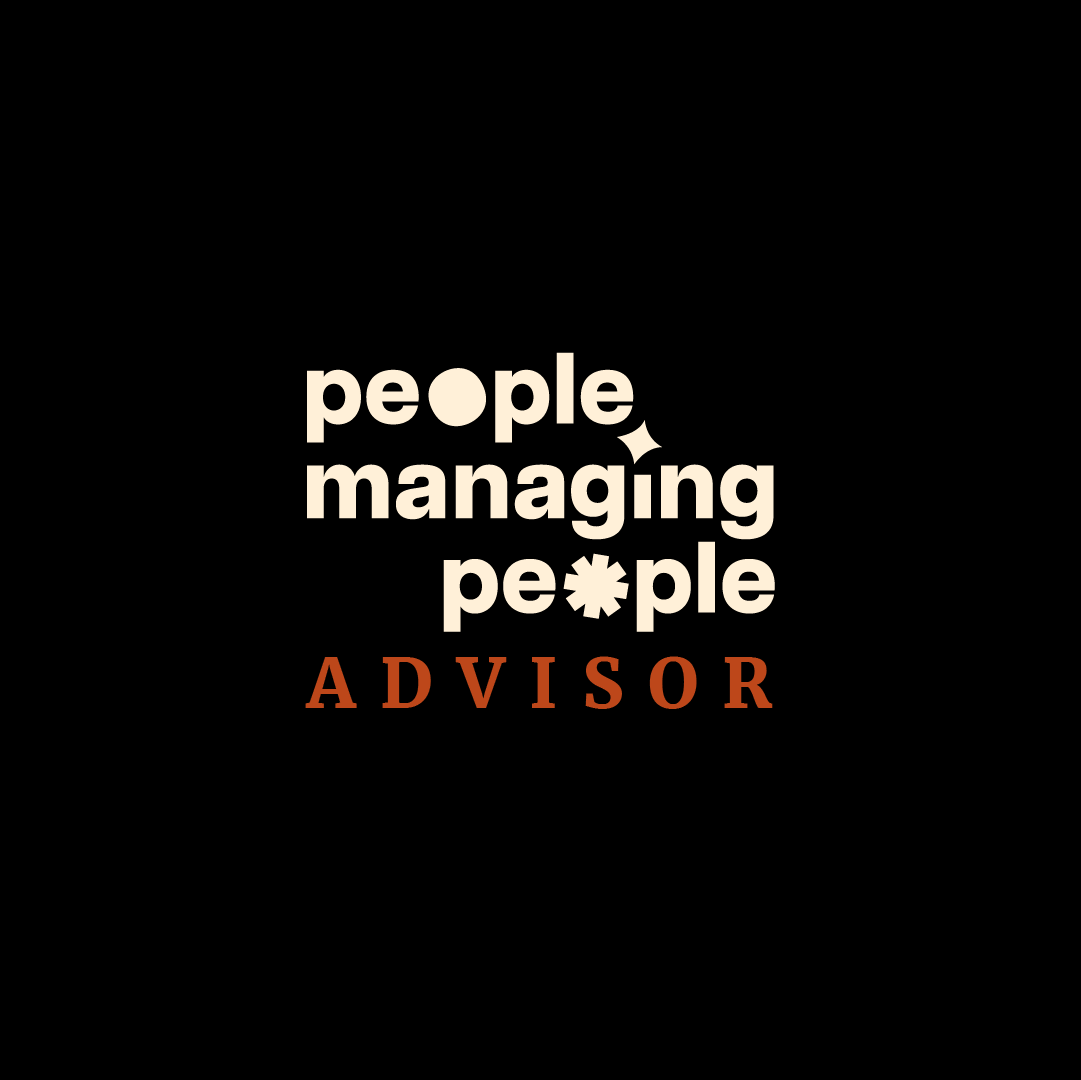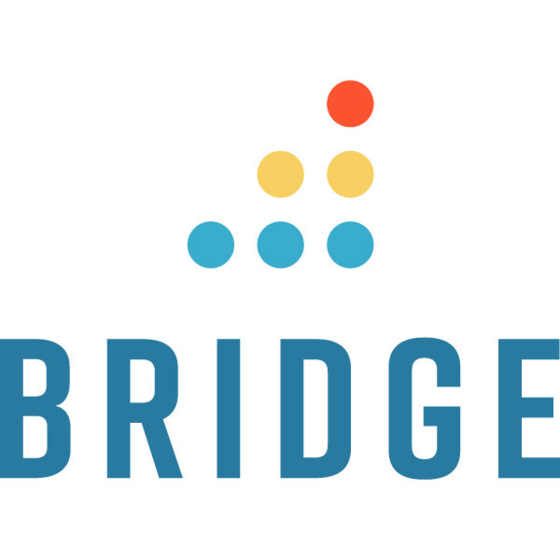Bridge is a learning management system designed to help teams with employee development and training. It offers multiple pricing tiers, allowing you to choose a plan that fits your team's needs, typically on a subscription basis.
Bridge helps you enhance your team's skills with features like course creation, performance tracking, and feedback tools. When it comes to learning management systems pricing, plans often vary based on features and user count, and Bridge fits right into this common model by offering flexible options to suit different organizational needs.
How Much Does Bridge Cost?
Bridge does not publish a simple per-user monthly price. Instead:
- Their pricing page states that annual agreements start at $12,500.
- Bridge uses a custom quote model, factoring in number of learners, modules, and integration requirements.
- Some third-party listings suggest plans or “editions” in the $4–$11/user/month range, but these should be treated cautiously (and may be outdated or for lighter versions).
You can request a demo through Bridge’s site to evaluate features before committing, but a free trial is not clearly advertised.
Bridge Plans & Pricing Tiers
Bridge structures its pricing tiers around the features and scale your team might need, such as learning management, skill development, and performance management. Pricing often varies based on the number of users, integrations, and onboarding needs. Bridge publishes three main tiers (product suites), each building on the previous: Learn/LMS, Talent Suite, and Full Suite.
| Plan Name | Pricing (Monthly/Annual) | Key Features Included | Best For |
|---|---|---|---|
| Learn (LMS) | Custom quote | Course authoring, mobile app, learning journeys, live training calendar, checkpoints, catalogs | Employee training and compliance |
| Talent Suite | Custom quote | All Learn features + skills mapping, AI learning recommendations, mentorship, feedback tools | Skill development and career pathing |
| Full Suite | Custom quote | Includes Talent Suite features, performance management tools, peer reviews, goal setting | Comprehensive training and performance |
All tiers require custom pricing — you must obtain a quote from Bridge. Bridge+1
Bridge also offers enhancements & add-ons (advanced authoring, engagement surveys, content hub) that can be layered on.

How to Choose The Right Bridge Plan
Navigating pricing structures can be tricky. When deciding on a learning management system, it's essential to consider factors like integrations and compliance. These elements help align your choice with your team's real-world needs, not just what's in the feature grid.
Selecting the right plan is more than picking a label—consider how your actual needs map to functionality and scale.
Evaluate Key Dimensions
- Learner volume: How many users / seats do you need?
- Feature depth: Do you need advanced performance, skills mapping, AI recommendations?
- Integration needs: Do you need SSO, data sync with HRIS, external content systems?
- Support & contract terms: What level of support and contract flexibility are essential?
- Scalability: The plan should scale with growth in learner count and modules.
Evaluate Security, Compliance & Scalability
- If your team handles sensitive or regulated data, verify that Bridge supports encryption, audit logs, and compliance options.
- For international or multi-entity organizations, ensure support for multiple locales, languages, and regulatory environments.
- Check backup, disaster recovery, and role-based access controls.
- Ask about maximum system load, performance under growth, and system uptime guarantees.
Bridge Pricing Compared to Alternatives
Bridge is generally positioned as a mid-range option in the learning management systems pricing landscape. It's neither the cheapest nor the most expensive, offering a good balance of features and price.
Bridge sits in a mid- to upper-tier LMS market. It is more feature-rich but requires a contract minimum.
What Affects Bridge Pricing?
Bridge pricing varies depending on your team's specific needs and usage patterns:
- Number of users: More users generally mean higher costs, as pricing scales with team size.
- Feature tier: Advanced features are often in higher tiers, affecting the overall price.
- Usage volume: Heavy usage may require a more robust plan, impacting your budget.
- Support requirements: Needing extensive support can increase costs, so consider your team's needs.
- Customizations: Tailoring Bridge to fit your unique requirements may come at an extra cost.
- Integration needs: Connecting Bridge with other tools might incur additional fees, depending on complexity.
Additional Costs to Watch Out For
Many learning management systems vendors don't always lay out the full cost structure upfront, leading to surprise fees after you've signed. Understanding what might not be included in the base price of Bridge can help your team avoid budget overruns or limited access. Consider writing a learning management systems RFP to clarify these details. Keep an eye on these additional costs:
Setup Fees or Onboarding Costs
Setup fees or onboarding costs can cover initial configuration and training. These fees often apply at the start and can vary based on complexity. Ask if these are included in your plan or charged separately. Knowing this upfront helps you budget accurately and avoid unexpected expenses.
Premium Support Tiers
Premium support tiers offer faster response times or dedicated assistance, but they come at a higher price. If your team needs frequent help, these costs can add up. Check if support is part of your plan or if it's an extra charge. Clarifying this ensures you get the support you need without breaking the bank.
Custom Integrations or API Usage
Custom integrations or API usage fees apply when connecting Bridge to other systems. These can be costly, especially if your team relies on multiple tools. Ask about integration costs during the buying process. Some plans may include basic integrations, but complex setups could incur additional charges.
Usage Overages
Usage overages occur when you exceed your plan's limits, like storage or bandwidth. These fees can surprise you if your usage spikes unexpectedly. Find out what your plan covers and what happens if you go over. This knowledge helps you plan usage and avoid extra charges.
Regulatory or Compliance Costs
Regulatory or compliance costs might arise if your industry has specific requirements. These can include audits or certifications that aren't part of the standard package. Ensure you know if Bridge can handle these needs and if there are extra fees. Discussing this upfront prevents compliance-related surprises later.
Is Bridge Worth the Cost?
In my opinion, Bridge offers solid value for mid-sized teams in industries like tech and healthcare. You typically see good ROI if you're focused on employee development and skill building.
Bridge stands out for its smooth onboarding and robust support. It integrates well with other systems, making it easier for your team to use.
- Clear Pricing: Plan details are straightforward, and trials are easy to access.
- Tailored Quotes: Sales reps tend to provide fair, customized quotes.
Customers often praise its user-friendly interface and comprehensive features, making it a strong choice for those needing a reliable learning management system.
Bridge Pricing FAQs
Here are answers to a few common questions about Bridge pricing:
Does Bridge offer a free trial or pilot?
Yes, Bridge offers a free trial. You can explore the platform's features and see how it fits your team's needs before committing to a paid plan.
Are discounts available for nonprofits or multi-year contracts?
Yes, discounts are available for nonprofits and when you commit to multi-year contracts. Contact Bridge's sales team to discuss your specific needs and access these promotions.
What's the average onboarding time?
Onboarding typically takes a few weeks, depending on your team's size and needs. Bridge offers support to help you get started smoothly.
Is the pricing likely to increase after the first year?
Pricing is typically stable, but it's a good idea to confirm any potential changes with your sales representative during contract discussions.
Are there additional costs for premium features?
Yes, some advanced features and integrations may come at an additional cost. It's essential to understand what's included in your plan and what might incur extra fees.
How can I get a customized quote?
To get a customized quote, contact Bridge directly. They'll tailor their pricing based on your team's specific needs and requirements.
What’s Next:
If you're in the process of researching learning management systems, connect with a SoftwareSelect advisor for free recommendations.
Just fill out a form and have a quick chat with an advisor to get into the specifics of your needs. You'll get a shortlist of software to review, and they'll even support you through the entire buying process, including price negotiations. We can help you find the best solution, at the best price, for your needs!
Pricing upon request
Free demo available





